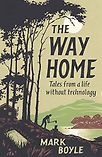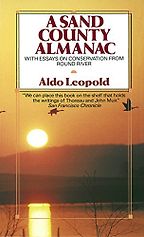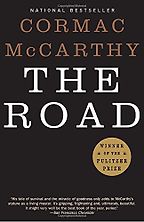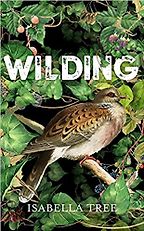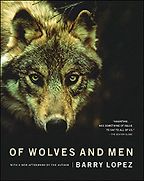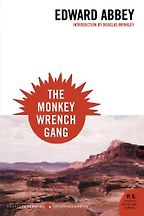You have been living without electricity or running water in rural Ireland since 2016. What was the appeal of transitioning to an off-grid lifestyle—and how does the reality of living in the wild compare to the ‘simple life’ fantasy?
This way of life is often called ‘the simple life’, but that’s entirely misleading. It’s actually quite complex, made up of a thousand simple things, like fetching spring water and carving spoons and trying to catch pike. By contrast, my old life in the city was quite simple, but made up of a thousand complex things, like smartphones and plug-sockets and plastic.
What I think people are pointing towards with that phrase, however, is the uncomplicated essence of it all—and, yes, there is a timeless simplicity to it. I’ve found that when you peel off the plastic that industrial civilisation vacuum-packs around you, what remains couldn’t be simpler. Healthy food. Something to be enthusiastic about. Fresh air. A sense of belonging and aliveness. Good water. Purpose. Intimacy. A vital connection to life. The kind of things I did without for too many years.
Anyone who has read Henry David Thoreau’s Walden twice probably fancies giving it a go at some point. I sense that the resurgent appeal of the so-called simple life is largely borne out of the pressure, stress and speed of modern living, with its relentless bills, emails, deadlines, debts, phone calls, advertising, text messages, noise, clutter and schedules. The tyranny of the clock is a terrible thing. Even Thoreau found modern living too much, and modern then was 1845. While we’re seduced by the supposed ‘comforts’ of technological society, trends in both physical and mental health would suggest we’re anything but comfortable. A lot of people want to slow down, wake up in the morning and do something they enjoy and care about, something which offers them meaning. When I was working 60 hours a week in business, that’s what I wanted myself.
In some respects, that is what I have found. There’s no extravagance, no clutter, no unnecessary complications. Only the raw ingredients of life, to be dealt with immediately and directly, with no middlemen to complicate and confuse the matter.
Get the weekly Five Books newsletter
That said, it certainly strays far from the romantic, bucolic idyll it’s sometimes portrayed to be. It’s actually a lot sweatier, bloodier and muckier than most people care to imagine. If you go into it thinking it’s going to be all honey and hot tubs, you’ll be sorely disappointed. But I love the elements in all their wildness, and I want to feel the whole gamut of human experience, even when it’s hard. I know the comforts of modern life as well as anyone, and still I choose this way.
People tell me all the time how they’d love to give it all up and live the simple life you refer to, usually with a wide grin and a dreaminess in their eyes. But few people do. The reasons why they don’t are as complicated as the political economy we’ve manufactured, but we have to start seeing technology as an addictive substance. Most alcoholics and drug addicts know they’d be better off if they got themselves clean. It’s similar with technology. Most people recognise that their tech use is seriously detrimental to their health and happiness, but continue to use it compulsively. My generation is being killed by comfort, and in more ways than one.
Is this what drove you to build your own cabin and to write a book documenting your lifestyle, The Way Home?
I quit technology primarily because industrial civilisation is wiping out life on earth. I don’t really talk about that in The Way Home, but if there is anything simple about what I do, it’s the truth of that. Sixty per cent of all wildlife gone in the last fifty years alone, much more if you begin counting from the early 1800s and the start of the industrial revolution. There are other social, geopolitical and cultural reasons why I decided to become an early rejector of industrial technology. I’m reluctant to write much about those these days, as we know them too well already, and it’s not for want of information that we continue down that road.
But there are other, more personal reasons that are just as important to me. I love the natural world, and I wanted to develop a deeper, more intimate relationship with it, in the same way that we might want to with our partners. There’s a lot spoken about something rather vague called ‘sustainability’, the idea of which I find abhorrent. If I asked you, ‘How is your relationship with your partner?’ and you replied, ‘Well, we’re trying to make it sustainable’, I’d suggest counselling. We need to fall in love with the natural world again, and to create cultures worth sustaining. You only protect what you love.
In my late twenties I also felt that I was in danger of going through life without ever having felt fully alive. I remember reading Edward Abbey’s Desert Solitaire and feeling that, like him, I wanted to lick the bare bones of existence clean, and to see the world, if only for one moment, as it is, on its own terms, devoid of all humanly ascribed qualities: ‘To meet God or Medusa face to face, even if it means risking everything human in myself.’
Let’s discuss your book recommendations. You’ve started with A Sand County Almanac, by Aldo Leopold. Published in 1949, this is a nature writing classic and has sold more than two million copies. Why have you chosen it?
It’s not easy to put my finger on exactly why I chose A Sand County Almanac. I contemplated it by the fire last night and found myself going through a similar process to Leopold in the essay “Axe-in-Hand”, where he attempts to understand why, whenever he has to fell a tree “for the good of the land”, he always chooses any tree but the pine. He examines all his biases—the fact that he planted the pine himself; that it will shelter more wildlife; because it is rare where he lives; it will live longer; that it could ultimately earn him more money; and so on—but none of these reasons survive his open and honest scrutiny. After a couple of pages of this he admits he’s none the wiser and says, “The only conclusion I have ever reached is that I love all trees, but I am in love with pines.”
“I love many books, but I am in love with A Sand County Almanac”
So why does this book take pride of place on my book shelf over, let’s say, Walden? Is it because it’s more relevant than ever, 70 years after its publication? That can’t be it, as Walden is a century older again, and equally as relevant. Perhaps it’s because Leopold is widely considered to be the father of conservation—or the grandfather of a grandchild he never met, “rewilding”—and has my admiration for the work he did in protecting wilderness. I can’t say it is, as I’m not thinking about any of that when I re-read and re-read and re-read this book. Is it because he’s a better naturalist than Thoreau? Well, he is, and every other nature writer too, but unlike the rest he feels no need to endlessly drop the names of obscure plants to puff up his feathers in that regard. I couldn’t bear it if he did.
I take the axe out of his hand, and see him with his pencil for a moment. Is it simply because he’s a brilliant writer? Maybe, but then again, so was Thoreau. Am I affected by his sincere humility and the calm, understated authority in his writing? Is it because it contains, in my view, the greatest essay ever written, “Thinking Like a Mountain”? Or was it his capacity to draw analogies from nature in a way that has taught me more about my place in the world than any other book? These are all quite plausible explanations, but still I’m not convinced.
The only conclusion I reached last night was that I love many books, but I am in love with A Sand County Almanac.
I wasn’t expecting to see Cormac McCarthy’s The Road on this list. Tell us about that.
It seems a strange choice, right? After all, on the surface it’s a novel set in a bleak post-apocalyptic world covered in the grey, ashen remains of a civilisation in which nothing grows. Those that have survived have done so by raiding the cupboards of the past and, in some cases, resorting to cannibalism in the face of starvation. It’s quite shocking and unsettling, in that sense. It stands in complete contrast to the recent wave of nature writing which, if you were to get carried away by some of it, would have you believe that things in the natural world have never been rosier.
On its simplest level, The Road shows us what it could be like to live on a planet where we’ve wiped out everything. It seemed like an extreme biblical vision until I read David Wallace-Wells’s The Uninhabitable Earth: Life After Warming, which appears to be (rightly, and brilliantly) scaring the shit out of everyone. I can already see the signs of this on the micro level too. While I was planting trees on four acres of industrially farmed land in Norfolk last year, I encountered three worms over a long weekend. Three. Though the rivers near me, which were teeming with fish only a century ago, are not the grim, black soup of ash and water that they are in The Road, most are just as dead and devoid of fish as they are in the nightmarish world McCarthy imagined. I could go on. I won’t. But in this sense The Road acts as a warning, showing us what a world without much life could look and feel like, and for that alone it is terribly important.
“It’s the greatest novel ever written and McCarthy one of the most important writers of the last hundred years”
But there is another aspect that gets overlooked. It gives the reader a deep insight into what it might feel like to be a wild animal. The man, and increasingly the boy, are always on the lookout, always aware that they could fall prey to cannibals. It keeps them alert at every moment, and in that sense they’re always present, always fully alive, even as they teeter on the brink of starvation. Death—for all animals, both predator and prey—is only kept at bay through absolute mindfulness. In our overly comfortable, sedated, too-safe civilised world, we need mindfulness colouring books and counselling to address our lack of connection to life and death. It’s as Leopold said: ‘Too much safety seems to yield only danger in the long run’.
In my view, The Road is the greatest novel ever written, and McCarthy one of the most important writers of the last hundred years. Its bleakness is interspersed with sentences so beautiful I wept. Reading it in front of a warm fire with a good, fresh meal also reminds me to be grateful for everything we still have. Whether or not we can save what’s left of the natural world is a big question, but we ought to at least savour it.
That brings us onto something completely different: Wilding, by Isabella Tree.
One of the most promising threads to emerge from the recent glut of nature writing is the idea of ‘rewilding’. The two most important books in this respect are George Monbiot’s Feral and, for different reasons, Isabella Tree’s Wilding. It was a close call, but I chose this one over Feral because, as important as Feral was in terms of popularising the idea of Europeans having a Serengeti on their own doorstep, Wilding is about the author and her husband’s attempts to create just that. Books such as Feral are only useful in so far as they lead to places like Knepp, the scene of Wilding.
As soon as you finish The Road or The Uninhabitable Earth, start Wilding. As much as we need honest reality checks, it’s also good to understand the potential for a meaningful response to it all. Wilding is about an extraordinary experiment at the 3,500-acre Knepp Wildland Project, and an example of what can happen when we learn to do the hardest thing of all: nothing.
We spoke to Isabella Tree after this book came out, and she said she “consciously didn’t call my book ‘Rewilding’ because that pesky little ‘re-’ prefix suggests to many rewilding detractors an attempt to recapture the past.” I thought that was interesting. It’s about letting go of our preconceived ideas of what it means to be ‘wild.’
What’s happening at Knepp is already changing out-dated notions of conservation in Britain and beyond. It’s a compelling illustration of how our landscapes could look and feel if we stopped trying to control the rest of life. Control is the enemy of wildness. Knepp demonstrates what can happen in a remarkably short space of time when you allow nature to take the driving seat, unencumbered by our preconceptions and meddling and narrow-minded goals. Without trying to conserve anything in particular, they’ve conserved more. Rare species—such as nightingales, purple emperor butterflies, turtle doves, peregrine falcons and countless others—are finding sanctuary there, and not always in the types of habitat conservationists and scientists were expecting.
I was moved, quite deeply, by this book. It’s a real story of hope at a time when genuine examples are as rare as some of the species making home there.
Let’s talk about Of Wolves and Men, by Barry Lopez. Lopez is best-known for his book about the far north, Arctic Dreams.
I should be clear that this book, in its totality, is not one of my favourite books. In fact, I found myself starting to glaze over parts in the second half. The reason I’ve gone for it is solely down to its first two chapters, the second of which is the most astounding piece of writing I’ve read on communication between species, in particular between apex predators and their prey. It changes everything we ever thought we knew about their relationship to each other, and to death. In doing so, it offers fascinating insights into the depths of understanding which civilised peoples have lost and what, if we were wise, we might attempt to regain. As the title suggests, this book is not just about wolves, but the lessons their ways can teach us button-pressing bipeds.
From the outset Lopez clearly sets out to dispel the myth of the wolf we think we know—the wolf that man created, the incomplete creature that does no justice to its complexity and mystery. Not only do we know so little about them, but most of what we do know comes from observing them in captivity, which is about as smart a way of understanding the true nature of the wolf as it is to discern the true nature of humans.
“To learn how to die well, one needs to learn how to live well first”
His description of a wolf moving through the woods, based on his own observations and the accounts of those who spent many years tracking them in the field, is spellbinding. It’s a depiction of an animal few people would recognise—the wolf that plays stick with herself, or the pack that stands ‘staring at the way water in a creek breaks around their legs and flows on’—and begins the process of helping us imagine the real, more complete wolf. In doing so Lopez shows that there is no one wolf, that each has as much personality and individuality as any human. That ought to be common sense, but most of us still think of the wolf (or any other animal) as a sort of static, generic beast. Lopez is quick to remind us, however, that even the picture he paints is only that—a picture, and not the creature itself.
But then the real gift arrives. It’s what Lopez calls ‘the conversation of death’, that moment where the eyes of predator and prey meet and a ‘ceremonial ritual’ begins, in which ‘both animals, not the predator alone, choose for the encounter to end in death’. Lopez gives many examples to back this up, and it absolutely demands to be read.
Five Books interviews are expensive to produce. If you're enjoying this interview, please support us by donating a small amount.
He goes on to explain how this conversation of death goes silent when wild predators meet with domestic livestock. He argues that when a wolf ‘wanders into a flock of sheep and kills 20 or 30 of them in apparent compulsion’, it is not so much ‘slaughter as a failure on the part of the sheep to communicate anything at all—resistance, mutual respect, appropriateness—to the wolf’. He adds that ‘The wolf . . . initiated a sacred ritual and met with ignorance.’ The whole thing is hard for us to get our over-civilised minds around, but various anthropological accounts suggest it’s something our ancestors understood innately.
After those opening chapters my interest started to wane. But those two chapters are as vital as any if you want to understand the ways in which animals, and humans, relate—or in our case, could relate—to the life surrounding us. It also reminded me how our relationship with death deeply affects how we live, and that not only is there ‘nothing wrong with dying, one should only strive to die well’. But to learn how to die well, one needs to learn how to live well first.
You quoted Edward Abbey at the start of this discussion. Now you want to recommend his novel, The Monkey Wrench Gang.
I’m an Edward Abbey fan, and so considering the topic there had to be one from him in here. It was a toss-up between this and his other classic, Desert Solitaire—a lyrical, eloquent and sometimes controversial paean to a place he loved, a place he himself fought to save from the mechanical jaws of rapacious industrialism. It recounts his retreat to the desert over a couple of seasons, working as a ranger but spending most of his time reflecting on the human condition, the wilderness around him, what it teaches us, and what we’re doing to it in pursuit of the dollar. It affected me profoundly.
Yes. I really, really love Desert Solitaire; I came across it when Robert Macfarlane recommended it to our site. But I haven’t read Abbey’s fiction.
Published seven years later, The Monkey Wrench Gang was the logical follow-up. It’s a novel about the antics of an eclectic bunch of wilderness enthusiasts who set out to save a part of the wilderness that Abbey knew like the calluses on his hands.
The book itself is hilarious, and brilliant in its own right. Its importance, however, in part stems from the wider impact it had in the years following its publication. It posed big questions about the morality of using violence, as a last resort, against the lifeless machines that inflict violence upon the living, breathing wilderness (this had been the subject of his Master’s thesis as a student), and it’s widely understood that the book gave rise to radical environmental groups across the world from the 1980s onwards. Arguably, not since Rachel Carson’s Silent Spring has a book had such an impact.
They tried to make a Hollywood movie out of the novel a couple of times, but in hindsight it was never going to happen; the idea of destroying private human property to protect non-human life proved too heretical for the big production companies to touch in the end. Thank goodness.
Finally: are you happier living as you do now? Do you feel that, by living as wildly as you can, you have escaped the stresses of modern life?
Each way of life brings with it its own beauty and challenge. Most of the time, yes, I am happier, and I have mostly circumvented the stresses of modern life. That said, I’ve acquired a couple of the struggles of ancient life. But I think contentment is something healthier to aim for than happiness.
The difference is subtle. Happiness is always something to be sought, something you can have a little bit more of, whereas contentment is happy just being itself. I’ve found that you can be content even amidst struggles and sadness. Contentment enjoys the moment and the feelings for what they are. Contentment doesn’t need anything more, or for things to be perfect. And I have found contentment, more or less.
Interview by Cal Flyn, Deputy Editor
April 18, 2019
Five Books aims to keep its book recommendations and interviews up to date. If you are the interviewee and would like to update your choice of books (or even just what you say about them) please email us at [email protected]

